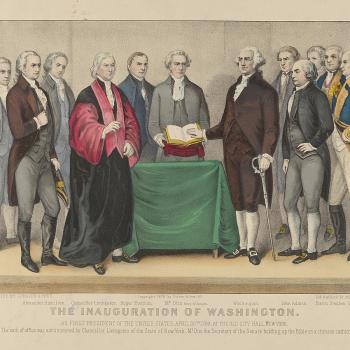If Lady Gaga's God doesn't look like the one preached in many churches, perhaps it's worth remembering that the Church and God are not one and the same. Behind the outrageous costumes and eccentric public behavior, Lady Gaga has demonstrated an ability to use her music to speak persuasively to youth on issues of faith and spirituality. Her music connects with the current generation of youth the way Madonna's music spoke to the generations who came of age in the 1980s and 1990s.
Many of Lady Gaga's songs are clearly intended to appeal to today's young people who see themselves as marginalized by their families, their schools, their churches, and their culture. This is certainly true of her latest hit "Born This Way," an anthem pledging solidarity with gay, lesbian, bisexual, and transgendered persons, ethnic minorities, and those who have been targets of bullying for whatever reason. The lyrics evoke a message of empowerment, challenging the listeners to celebrate themselves for who they are:
I'm beautiful in my way
'Cause God makes no mistakes
I'm on the right track baby
I was born this way
Don't hide yourself in regret
Just love yourself and you're set
I'm on the right track baby
I was born this way
It's obvious why many reviewers have sensed religious overtones within the song, particularly echoes of Jesus' own ministry to the outcasts of his culture. It's difficult to read the gospels and miss how often Jesus' message of God's unconditional love is aimed at those who have been told by the world that they are shameful and have no value. "Born This Way" carries a similar challenge to outcast youth to stand up and be the people God created them to be, regardless of what others might say. But these religious overtones in the song are also the very reason that some traditional Christians have criticized both the tune and the artist. "What about sin?" they're asking. "If we are all created good just as we are, why do we need a savior?" To be sure, Lady Gaga doesn't seem to adhere to orthodox Christian notions of original sin or "the fall."
I find it interesting and even a little serendipitous that this musical debate comes just as we are entering into the time of Lent. For many Christians, Lent is seen as a penitential season when we confess our sins and the ways in which we have failed to follow Christ. We often begin Lent by telling the story of Jesus' temptations in the wilderness and we are challenged to consider where we too have been tempted and, unlike Jesus, have given into those temptations.
As a youth being raised in the Methodist church, I remember Lent as the time of year when Sunday worship included an added prayer in which we confessed what terrible people we had been, born into sin and unworthy as we were of God's love. This prayer was followed by the pastor explaining that our sins were forgiven through the sacrifice of Jesus on the cross. I wondered at that young age why my father, a retired pastor himself, rarely participated in those prayers but now I think I understand. For those of us who do not literalize the story of Adam and Eve, there is also no need to literalize the Christian interpretation of Genesis in which humankind fell from a perfect creation into an imperfect one and thus had to wait, mired in sin, until a savior could come and pay our ransom. This theological perspective that sees all persons as born into sin is not persuasive for those Christians who acknowledge that we now live on this side of Darwin.
We know what the writers of Genesis did not: that humankind did not fall from perfection but rather has been evolving over billions of years. Evolution continues, and we are a people who are always "becoming" more fully what God would have us be. To be sure, this theological understanding has little use for the atonement and carries with it a pretty high sense of anthropology, but this too is part of the Genesis narrative. We are created, declares Genesis, in God's own image and God has called us good. This seems to be the very message that Lady Gaga's mother passed on to her:
My mama told me when I was young
We are all born superstars
She rolled my hair and put my lipstick on
In the glass of her boudoir
"There's nothin' wrong with lovin' who you are"
She said, "'cause he made you perfect, babe"
"So hold your head up girl and you'll go far,
Listen to me when I say"
Some will argue that Lady Gaga has gone too far, that we just can't go around telling everybody that they are okay just the way they are. But this assertion misses the point of the song, which is directed at those who have been beaten down their entire lives and whose salvation will not come through condemnation but only through Christ's message of love.
I'm not sure why, over the many years of the Church's existence, we have often ignored this approach and have instead preferred to tell the story of humankind's innate depravity and sinfulness. Many recent national surveys indicate that young people today primarily identify the Church, not with a message of love, but with a message of judgment and self-righteousness. They see the Church as quick to label others and to turn away those deemed to be living outside of a proper "Christian lifestyle." It is no wonder then that some youth see the Jesus of scripture mirrored more in the music of popular culture than in the life of the Church. Lady Gaga speaks directly to those the Church would condemn and offers an alternative vision of a world without judgment—not unlike Jesus' own vision of a Kingdom of God centered in grace and forgiveness.





